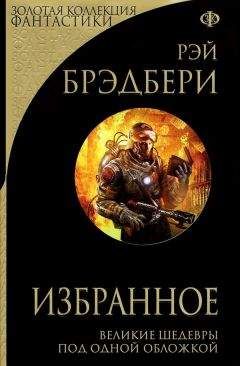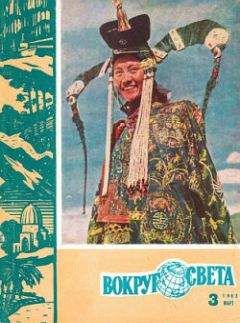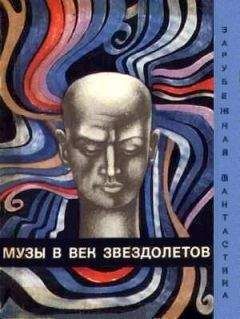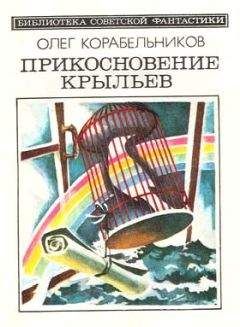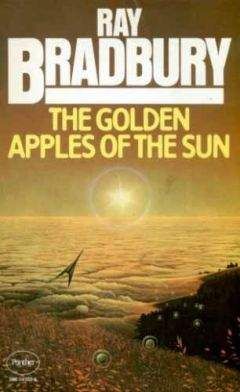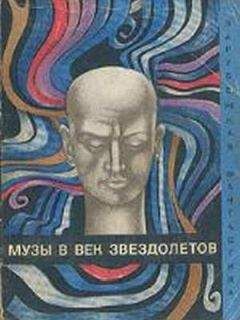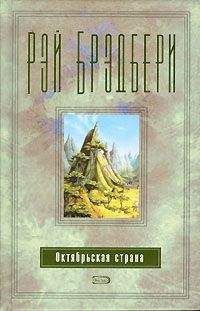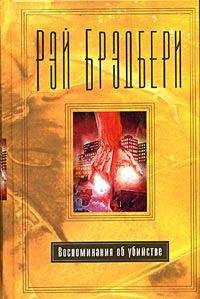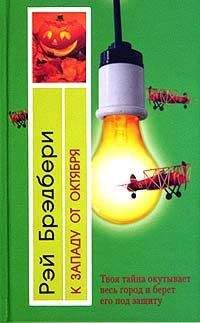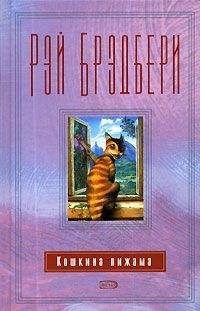Рэй Бредбери - Октябрьская страна (The October Country), 1955
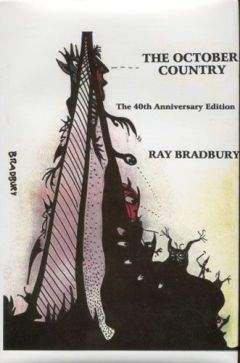
Скачивание начинается... Если скачивание не началось автоматически, пожалуйста нажмите на эту ссылку.
Жалоба
Напишите нам, и мы в срочном порядке примем меры.
Описание книги "Октябрьская страна (The October Country), 1955"
Описание и краткое содержание "Октябрьская страна (The October Country), 1955" читать бесплатно онлайн.
И вновь сборник «ужастиков» раннего Брэдбери, разбавленных поздними житейско-психологическими историями («Прикосновение пламени»). Из ранних своих запасов писатель извлёк на свет настоящие жемчужины: такие как «Озеро» и «Коса».
"I'm not shaving again till we reach Texas."
"You can't go around looking like a tramp!"
"I can and will. I've shaved every morning for thirty god-damn mornings and put on a tie and had a crease in my pants. From now on, no pants, no ties, no shaving, no nothing."
He yanked the covers over his ears so violently that he pulled the blankets off one of his naked legs.
The leg hung upon the rim of the bed, warm white in the sunlight, each little black hair-perfect.
Her eyes widened, focused, stared upon it. She put her hand over her mouth, tight.
He went in and out of the hotel all day. He did not shave. He walked along the plaza tiles below. He walked so slowly she wanted to throw a lightning bolt out of the window and hit him. He paused and talked to the hotel manager below, under a drum-cut tree, shifting his shoes on the pale blue plaza tiles. He looked at birds on trees and saw how the State Theatre statues were dressed in fresh morning gilt, and stood on the comer, watching the traffic carefully. There was no traffic! He was standing there on purpose, taking his time, not looking back at her. Why didn't he run, lope down the alley, down the hill to the garage, pound on the doors, threaten the mechanics, lift them by their pants, shove them into the car motor! He stood instead, watching the ridiculous traffic pass. A hobbled swine, a man on a bike, a 1927 Ford, and three half-nude children. Go, go, go, she screamed silently, and almost smashed the window.
He sauntered across the street. He went around the corner. All the way down to the garage he'd stop at windows, read signs, look at pictures, handle pottery. Maybe he'd stop in for a beer. God, yes, a beer.
She walked in the plaza, took the sun, hunted for more magazines. She cleaned her fingernails, burnished them, took a bath, walked again in the plaza, ate very little, and returned to the room to feed upon her magazines.
She did not lie down. She was afraid to. Each time she did she fell into a half-dream, half-drowse in which all her childhood was revealed in a helpless melancholy. Old friends, children she hadn't seen or thought of in twenty years filled her mind. And she thought of things she wanted to do and had never done. She had meant to call Lila Holdridge for the past eight years since college, but somehow she never had. What friends they had been! Dear Lila! She thought, when lying down, of all the books, the fine new and old books, she had meant to buy and might never buy now and read. How she loved books and the smell of books. She thought of a thousand old sad things. She'd wanted to own the Oz books all her life, yet had never bought them. Why not? while yet there was life! The first thing she'd do would be to buy them when she got back to New York! And she'd call Lila immediately! And she'd see Bert and Jimmy and Helen and Louise, and go back to Illinois and walk around in her childhood place and see the things to be seen there. If she got back to the States. If. Her heart beat painfully in her, paused, held on to itself, and beat again. If she ever got back.
She lay listening to her heart, critically.
Thud and a thud and a thud. Pause. Thud and a thud and a thud. Pause.
What if it should stop while she was listening?
There!
Silence inside her.
"Joseph!"
She leaped up. She grabbed at her breasts as if to squeeze, to pump to start the silent heart again!
It opened in her, closed, rattled and beat nervously, twenty rapid, shot-like times!
She sank on to the bed. What if it should stop again and not start? What would she think? What would there be to do? She'd die of fright, that's what. A joke; it was very humorous. Die of fright if you heard your heart stop. She would have to listen to it, keep it beating. She wanted to go home and see Lila and buy the books and dance again and walk in Central Park and-listen-
Thud and a thud and a thud. Pause.
Joseph knocked on the door. Joseph knocked on the door and the car was not repaired and there would be another night, and Joseph did not shave and each little hair was perfect on his chin, and the magazine shops were closed and there were no more magazines, and they ate supper, a little bit anyway for her, and he went out in the evening to walk in the town.
She sat once more in the chair and slow erections of hair rose as if a magnet were passed over her neck. She was very weak and could not move from the chair, and she had no body, she was only a heart-beat, a huge pulsation of warmth and ache between four walls of the room. Her eyes were hot and pregnant, swollen with child of terror behind the bellied, tautened lids.
Deeply inside herself, she felt the first little cog slip. Another night, another night, another night, she thought. And this will be longer than the last. The first little cog slipped, the pendulum missed a stroke. Followed by the second and third interrelated cogs. The cogs interlocked, a small with a little larger one, the little larger one with a bit larger one, the bit larger one with a large one, the large one with a huge one, the huge one with an immense one, the immense one with a titanic one….
A red ganglion, no bigger than a scarlet thread, snapped and quivered; a nerve, no greater than a red linen fiber twisted. Deep in her one little mech was gone and the entire machine, unbalanced, was about to steadily shake itself to bits.
She didn't fight it. She let it quake and terrorize her and knock the sweat off her brow and jolt down her spine and flood her mouth with horrible wine. She felt as if a broken gyro tilted now this way, now that and blundered and trembled and whined in her. The color fell from her face like light leaving a clicked-off bulb, the crystal cheeks of the bulb vessel showing veins and filaments all colorless….
Joseph was in the room, he had come in, but she didn't even hear him. He was in the room but it made no difference, he changed nothing with his coming. He was getting ready for bed and said nothing as he moved about and she said nothing but fell into the bed while he moved around in a smoke-filled space beyond her and once he spoke but she didn't hear him.
She timed it. Every five minutes she looked at her watch and the watch shook and time shook and the five fingers were fifteen moving, reassembling into five. The shaking never stopped. She called for water. She turned and turned upon the bed. The wind blew outside, cocking the lights and spilling bursts of illumination that hit buildings glancing sidelong blows, causing windows to glitter like opened eyes and shut swiftly as the light tilted in yet another direction. Downstairs, all was quiet after the dinner, no sounds came up into their silent room. He handed her a water glass.
"I'm cold, Joseph," she said, lying deep in folds of cover.
"You're all right," he said.
"No, I'm not. I'm not well. I'm afraid."
"There's nothing to be afraid of."
"I want to get on the train for the United States."
"There's a train in Leon, but none here," he said, lighting a new cigarette.
"Let's drive there."
"In these taxis, with these drivers, and leave our car here?"
"Yes. I want to go."
"You'll be all right in the morning."
"I know I won't be. I'm not well."
He said, "It would cost hundreds of dollars to have the car shipped home."
"I don't care. I have two hundred dollars in the bank home. I'll pay for it. But, please, let's go home."
"When the sun shines tomorrow you'll feel better, it's just that the sun's gone now."
"Yes, the sun's gone and the wind's blowing," she whispered, closing her eyes, turning her head, listening. "Oh, what a lonely wind. Mexico's a strange land. All the jungles and deserts and lonely stretches, and here and there a little town, like this, with a few lights burning you could put out with a snap of your fingers …"
"It's a pretty big country," he said.
"Don't these people ever get lonely?"
"They're used to it this way."
"Don't they get afraid, then?"
"They have a religion for that."
"I wish I had a religion."
"The minute you get a religion you stop thinking," he said. "Believe in one thing too much and you have no room for new ideas."
"Tonight," she said, faintly. "I'd like nothing more than to have no more room for new ideas, to stop thinking, to believe in one thing so much it leaves me no time to be afraid."
"You're not afraid," he said.
"If I had a religion," she said, ignoring him, "I'd have a lever with which to lift myself. But I haven't a lever now and I don't know how to lift myself."
"Oh, for God's-" he mumbled to himself, sitting down.
"I used to have a religion," she said.
"Baptist."
"No, that was when I was twelve. I got over that. I mean -later."
"You never told me."
"You should have known," she said.
"What religion? Plaster saints in the sacristy? Any special special saint you liked to tell your beads to?"
"Yes."
"And did he answer your prayers?"
"For a little while. Lately, no, never. Never any more. Not for years now. But I keep praying."
"Which saint is this?"
"Saint Joseph."
"Saint Joseph." He got up and poured himself a glass of water from the glass pitcher, and it was a lonely trickling sound in the room. "My name."
"Coincidence," she said.
They looked at one another for a few moments.
He looked away. "Plaster saints," he said, drinking the water down.
After a while she said, "Joseph?" He said, "Yes?" and she said, "Come hold my hand, will you?" "Women," he sighed. He came and held her hand. After a minute she drew her hand away, hid it under the blanket, leaving his hand empty behind. With her eyes closed she trembled the words, "Never mind. It's not as nice as I can imagine it. It's really nice the way I can make you hold my hand in my mind." "Gods," he said, and went into the bathroom. She turned off the light. Only the small crack of light under the bathroom door showed. She listened to her heart. It beat one hundred and fifty times a minute, steadily, and the little whining tremor was still in her marrow, as if each bone of her body had a blue-bottle fly imprisoned in it, hovering, buzzing, shaking, quivering deep, deep, deep. Her eyes reversed into herself, to watch the secret heart of herself pounding itself to pieces against the side of her chest.
Water ran in the bathroom. She heard him washing his teeth.
"Joseph!"
"Yes," he said, behind the shut door.
"Come here."
"What do you want?"
"I want you to promise roe something, please, oh, please."
"What is it?"
"Open the door, first."
"What is it?" he demanded, behind the closed door.
"Promise me," she said, and stopped.
"Promise you what?" he asked, after a long pause.
"Promise me," she said, and couldn't go on. She lay there. He said nothing. She heard the watch and her heart pounding together. A lantern creaked on the hotel exterior. "Promise me, if anything-happens," she heard herself say, muffled and paralyzed, as if she were on one of the surrounding hills talking at him from the distance, "-if any-thing happens to me, you won't let me be buried here in the graveyard over those terrible catacombs!"
"Don't be foolish," he said, behind the door.
"Promise me?" she said, eyes wide in the dark.
"Of all the foolish things to talk about."
"Promise, please promise?"
"You'll be all right in the morning," he said.
"Promise so I can sleep. I can sleep if only you'd say you wouldn't let me be put there. I don't want to be put there."
"Honestly," he said, out of patience.
"Please," she said.
"Why should I promise anything so ridiculous?" he said. "You'll be fine tomorrow. And besides, if you died, you'd look very pretty in the catacomb standing between Mr. Grimace and Mr. Gape, with a sprig of morning-glory in your hair." And he laughed sincerely.
Silence. She lay there in the dark.
"Don't you think you'll look pretty there?" he asked, laughingly, behind the door.
She said nothing in the dark room.
"Don't you?" he said.
Somebody walked down below in the plaza, faintly, fading away.
"Eh?" he asked her, brushing his teeth.
She lay there, staring up at the ceiling, her breast rising and falling faster, faster, faster, the air going in and out, in and out her nostrils, a little trickle of blood coming from her clenched lips. Her eyes were very wide, her hands blindly constricted the bedclothes.
"Eh?" he said again behind the door.
She said nothing.
"Sure," he talked to himself. "Pretty as hell," he murmured, under the flow of tap water. He rinsed his mouth. "Sure," he said.
Nothing from her in the bed.
"Women are funny," he said to himself in the mirror.
She lay in the bed.
"Sure," he said. He gargled with some antiseptic, spat it down the drain. "You'll be all right in the morning," he said.
Not a word from her.
"We'll get the car fixed."
She didn't say anything.
"Be morning before you know it." He was screwing caps on things now, putting freshener on his face. "And the car fixed tomorrow, maybe, at the very latest the next day. You won't mind another night here, will you?"
She didn't answer.
"Will you?" he asked.
No reply.
The light blinked out under the bathroom door.
"Marie?"
He opened the door.
"Asleep?"
She lay with eyes wide, breasts moving up and down.
"Asleep," he said. "Well, good night, lady."
He climbed into his bed. "Tired," he said.
No reply.
"Tired," he said.
The wind tossed the lights outside; the room was oblong and black and he was in his bed dozing already.
She lay, eyes wide, the watch ticking on her wrist, breasts moving up and down.
It was a fine day coming through the Tropic of Cancer. The automobile pushed along the turning road leaving the jungle country behind, heading for the United States, roaring between the green hills, taking every turn, leaving behind a faint vanishing trail of exhaust smoke. And inside the shiny automobile sat Joseph with his pink, healthy face and his Panama hat, and a little camera cradled on his lap as he drove; a swathe of black silk pinned around the left upper arm of his tan coat. He watched the country slide by and absent-mindedly made a gesture to the seat beside him, and stopped. He broke into a little sheepish smile and turned once more to the window of his car, humming a tuneless tune, his right hand slowly reaching over to touch the seat beside him…
Which was empty.
The Next in Line 1947( Следующий)
Переводчик: Воронежская М.
Окна выходили на некое подобие городского сквера – надо сказать, довольно жалкое подобие. Впрочем, некоторые его составные части освежали зрелище: эстрада, чем-то напоминающая коробку из-под конфет (по четвергам и воскресеньям какие-то люди разражались здесь громкой музыкой), ряды бронзовых скамеек, богато украшенных всякими позеленевшими излишествами и завитками, а также прелестные дорожки, выложенные голубой и розовой плиткой – голубой, как только что подведенные женские глазки, и розовой, как тайные женские же мечты. Дополняли очарование остриженные на французский манер деревья с кронами в виде огромных шляпных коробок. В целом же, глядя из окна гостиницы, человек, не лишенный воображения, мог бы принять это место за какую-нибудь французскую виллу конца девяностых годов. И, конечно, ошибся бы. Все это находится в Мексике. Обычная плаза – площадь в маленьком колониальном городке, где в государственном оперном театре всего за два песо вам покажут замечательные фильмы: "Распутин и императрица", "Большой дом", "Мадам Кюри", "Любовное приключение" или "Мама любит папу".
Подписывайтесь на наши страницы в социальных сетях.
Будьте в курсе последних книжных новинок, комментируйте, обсуждайте. Мы ждём Вас!
Похожие книги на "Октябрьская страна (The October Country), 1955"
Книги похожие на "Октябрьская страна (The October Country), 1955" читать онлайн или скачать бесплатно полные версии.
Мы рекомендуем Вам зарегистрироваться либо войти на сайт под своим именем.
Отзывы о "Рэй Бредбери - Октябрьская страна (The October Country), 1955"
Отзывы читателей о книге "Октябрьская страна (The October Country), 1955", комментарии и мнения людей о произведении.





